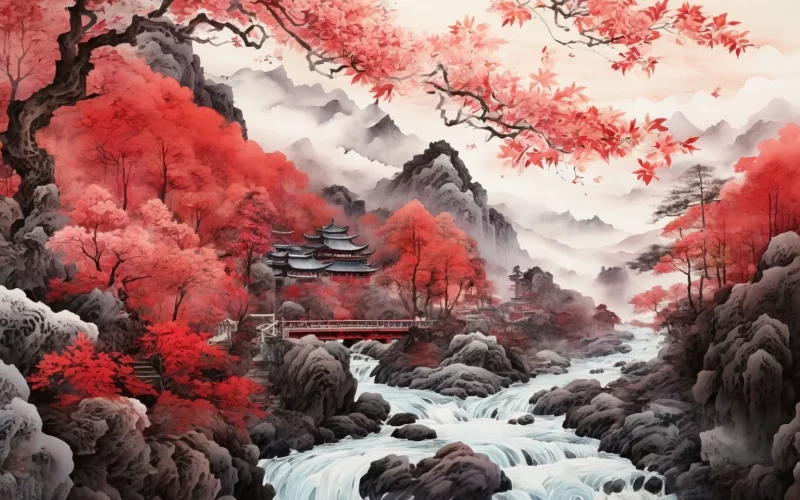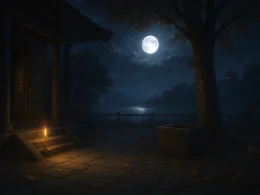The crescent moon looks like old Autumn's golden brow;
Its deep reflection flows with limpid water blue.
I'll leave the town on Clear Stream for the Three Gorges now.
O Moon, how I miss you when you are out of view!
Original Poem
「峨眉山月歌」
李白
峨眉山月半轮秋,影入平羌江水流。
夜发清溪向三峡,思君不见下渝州。
Interpretation
This poem was composed in 725 AD, when Li Bai left his hometown in Sichuan and traveled east along the Yangtze River. During his journey, he set off at night from Qingxi, passed by Mount Emei and the Pingqiang River, and eventually headed toward the Three Gorges and Yuzhou. At this time, Li Bai was young and ambitious, eager to explore the world and achieve great deeds. However, as he sailed under the moonlight with the river flowing by, the scenery stirred his emotions, and he couldn't help but think of a distant friend, leading him to write this highly evocative and emotionally resonant poem.
First Couplet: “峨眉山月半轮秋,影入平羌江水流。”
É méi shān yuè bàn lún qiū, yǐng rù píng qiāng jiāng shuǐ liú.
The half-moon of autumn hangs over Mount Emei; its reflection flows into the Pingqiang River.
The poet begins with the image of the moon, indicating that the journey takes place in autumn. The "half-moon of autumn" not only depicts the beauty of the night but also adds a touch of melancholy to the farewell. The moon's reflection flows with the river, suggesting both the majestic scenery of the night voyage and the poet's own sense of wandering and transience.
Second Couplet: “夜发清溪向三峡,思君不见下渝州。”
Yè fā qīng xī xiàng sān xiá, sī jūn bù jiàn xià yú zhōu.
At night, I set off from Qingxi toward the Three Gorges; missing you but unable to see you, I continue on to Yuzhou.
The poet describes his night journey, setting off from Qingxi and sailing downstream toward the Three Gorges. Yet, under the night sky, he longs for a distant friend he cannot meet, and with reluctance, he continues his journey to Yuzhou. This sense of "missing you but unable to see you" blends deep friendship with the loneliness of travel, adding emotional depth to the poem.
Overall Appreciation
The poem uses the nighttime river journey as its backdrop, painting a picture of a moonlit river and a distant voyage. The first half focuses on the scenery, depicting the autumn moon over Mount Emei and the Pingqiang River, creating a serene yet flowing beauty. The moon's reflection drifting with the river hints at the poet's own sense of wandering. The second half shifts to emotion, as the poet sails from Qingxi, longing for a friend he cannot meet, and continues downstream. This sense of reluctant farewell is expressed with profound simplicity, blending scenery and emotion seamlessly and leaving a lasting impression.
Writing Characteristics
- Place Names Enhance Realism: The poem includes five place names—Mount Emei, Pingqiang River, Qingxi, Three Gorges, and Yuzhou—vividly depicting the poet's long night journey and enhancing the sense of place.
- Blending Movement and Stillness: The moon hangs still in the sky, while the river flows and the poet sails onward, creating a scene that is both static and dynamic.
- Scene and Emotion Intertwined: The poet uses the scenery to express his emotions. The moon reflecting on the river and the flowing water not only depict the journey's landscape but also symbolize the poet's wandering and longing, adding layers of meaning and emotional resonance.
Insights
This poem not only captures Li Bai's bold aspirations as he embarks on his first long journey but also reveals his reluctance to part with his hometown and friends. Life is a journey, and everyone experiences moments of departure and separation. Along the way, there will always be people and places we miss and cherish. This poem reminds us that, even as we face a long and uncertain road ahead, we must carry hope and move forward, embracing both the longing and the farewells that come with it.
Poem translator
Xu Yuan-chong(许渊冲)
About the poet

Li Bai (李白), 701 - 762 A.D., whose ancestral home was in Gansu, was preceded by Li Guang, a general of the Han Dynasty. Tang poetry is one of the brightest constellations in the history of Chinese literature, and one of the brightest stars is Li Bai.











